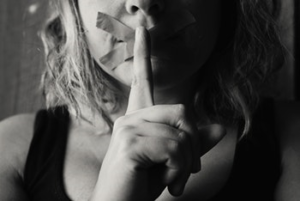Secrets are an eating disorder’s best friend
Secrets are an eating disorder’s best friend

There is no such thing as a good secret
by June Alexander
How do you cope with secrets in your family and within your own self? When you become aware of a secret, do you set about dismantling it, or do you ignore it, and pretend you “know nothing?”
Secrets deeply shaped my early life. Some of them occurred when I was too young, or too traumatized, to remember them or understand them. Other secrets developed from age 11 with my eating disorder, and became layered with shame and stigma. Once a secret is created, it may become submerged in layers. As time passes, pressure builds, eventually a crack occurs, and wham, there is an eruption. Timing of a secret’s release greatly affects impact of the fallout.
Complications increase when, besides eating disorder secrets, there are family secrets. As an adolescent and young adult, each time I questioned my past, my mother was dismissive, saying “that’s water under the bridge,” “you think too much,” “focus on now.” Focusing on “now” is good advice, but not when something deep within needs attention. I seemed to have a hole in my soul that I could not fill. It would not allow me to feel settled or safe.
An awareness of secrets in my family began to emerge in my early 30’s, each revelation providing a clue for re-piecing the shattered jigsaw that was “me.” Through a phone call from my sister, I learned details of sexual abuse that occurred in our early childhood.
This startling information helped to explain family behaviors that had bewildered me for years.
Now this secret had surfaced, I wanted and needed to talk to close others, especially our parents, to heal wounds and seek justice, but my sister discouraged this (“We would only upset them, and Mum might have a heart attack”). The behavior developed in childhood therefore continued; my sole confidant, the diary, became loaded with more outpourings, now as a refuge in struggling to come to terms with the pain of knowing only part of my story. As the years passed, more secrets would be revealed and the outfall would continue.
Writing and sharing with my treatment team has helped me to heal and free myself to live a full life free of the impact of hidden family secrets.
Writing letters – a form of conversation
Writing as a way of expressing emotions instead of repressing them, can help you feel better about your self. By tracing feelings back to traumatic events, and reflecting on them, you can defuse their power to affect you in the present.
When my treatment team encouraged me to do this, even though many years had passed, I began to experience calm instead of chaos and peace instead of torment. I gained sufficient self-awareness to realize when “something is bothering me,” and became more able to follow the feeling, find the cause and attend to it. This skill allowed decision-making to occur without feeling overly anxious or defaulting to ED behaviors such as restricting food intake or binge eating to ease distress when sad or confused. Any time is a good time to write.
When feeling stuck, or lost…Write
The diary can help you to heal, express, and extend yourself through establishing a narrative connection. Even when not facing a serious health challenge or other life issue, writing a diary can be beneficial. As a tool for communicating, it can help others to understand you and create opportunity for generating, belonging to, and enriching a community of caring.
Anything that holds meaning for you, and has a date on it, can go in your diary. Some diarists write poetry, paint, take photographs and caption them, or create collages. Some post blogs or use other forms of social media. You will read about what other diarists do as you journey through The Diary Healer. The diary is a place where thoughts and feelings can run free and whatever form of self-expression suits you, is right.
The diary helps me to know who I am, helps to keep me grounded and be mindful of self-care. I write for about 20 minutes daily and sometimes, several times in one day. Anywhere and wherever I go, the diary goes too.
The diary, like a best friend, does not judge. But there is a “but.” Writing a diary can help you to analyze situations and experiences, and pursue the “right” path, but does not guarantee it. My own history reveals diary writing can also encourage disconnection from, and denial of, self. Recovery from my eating disorder, and childhood or adult trauma, was greatly assisted through sharing my writing with a trusted mentor.
Create an inner picture with narrative snapshots
Diary entries create a series of snapshots. Each entry we make becomes a snapshot recorded and fixed in time, reflecting our moods, feelings and insights at any moment. Each entry is individual, but together they preserve and reveal a reality, which cannot be changed and can be reflected on and re-storied to provide healing and guidance for today and tomorrow. The diary is potentially a great teacher. The challenge is to reach out, share, and learn its lessons. In my experience, no secret is a good secret.
To be continued.
For now, I share this pearl of wisdom from Anne, a fellow-traveler in healing, and participant in The Diary Healer:
Black Birds and Butterflies
If you have suffered abuse of any kind,
as I have,
you may have stuffed the memories
so deep inside yourself that you don’t even know
But, they are there, hurting you.
Black birds, I call them. A friend once told me “You’re as sick
as the secrets you keep.”
I got very sick
until I started to tell. When I did,
the black birds
started flying out of me. I’m still telling,
and the black birds keep flying, chased away
by something beautiful, yet strong — Butterflies!
They are the real me, the real you.
I don’t want to be sick anymore. I don’t want you to be sick either. Please tell,
Even though it’s a scary thing to do. Get rid of those black birds.
The butterflies will help us to be well and free again.
Anne, in The Diary Healer
Further Reading
- Using Writing as a Therapy for Eating Disorders _ The Diary Healer https://www.routledge.com/Using-Writing-as-a-Therapy-for-Eating-Disorders-The-diary-healer/Alexander/p/book/9781138788374
- Costin, C., & Grabb, G. S. (2011) 8 keys to recovery from an eating disorder: Effective strategies from therapeutic practice and personal experience (8 keys to mental health): WW Norton & Company.





